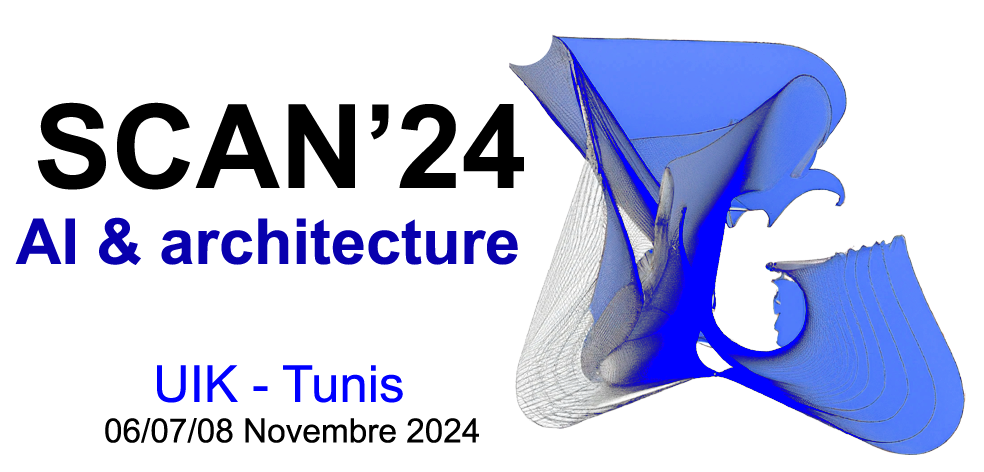Main menu
HELP
|
Digital Architectural Design Seminar This 11th edition of the SCAN “Artificial Intelligence and Architecture” is organized by Ibn Khaldoun University, under the aegis of the Research Association on Digital Architectural Design (ARCAN). SCAN'24 Artificial Intelligence and Architecture The Digital Architectural Design Seminar (SCAN) is a biannual meeting that brings together researchers, teachers and architects to reflect together on the implications of digital technology in architectural design. After tackling the themes of digital sketching (2005), digital image (2007), environmental approaches (2009), collaborative space (2010), the complexities of digital architecture models (2012 ), of the interaction(s) of digital models (2014), of the measure and excess of the project (2016), of the immersion-emersion dynamic (2018), of the return to the future (2020), and of the digital ecosystem (2022), the 2024 edition of SCAN proposes to focus on Artificial Intelligence (AI) applied to architectural and urban design. Indeed, AI is interfering more and more in all areas and architectural and urban design is becoming concerned with the contributions, challenges and questions that AI poses in technological, scientific, cultural, professional and legal terms. and ethics. On the one hand, it offers new opportunities to rethink architectural and urban design and new possibilities for the use of digital technology in architecture that could transform the way architecture is designed, built and used. It also raises ethical, legal, social and environmental issues that need to be discussed. Is a creative symbiosis between man and machine possible in the field of architectural and urban design? In this context, the theme of SCAN'24 will focus on advances in AI applied to architecture. It explores the applications and implications of AI in the design, planning, construction and management of the built environment. He will discuss the different approaches of AI applied to architecture such as machine learning, generative design, multi-agent systems and will question the opportunities and challenges they present for the professions of the built environment (architects, urban planners , designers, engineers, etc.). SCAN 2024 invites researchers, teachers and practitioners to submit communication proposals on (non-exhaustive list): - Applications of AI in architectural and urban design: what are the technological advances in this field and how can they be used to improve the quality of design? - Ethical, social and environmental issues related to AI in architectural and urban design: how to deal with the challenges posed by the use of AI in architectural and urban design, particularly in terms of security, data protection , intellectual property, sustainability and social responsibility? - Future prospects of AI in architectural and urban design: what are the most promising trends for the use of AI in architectural and urban design in the medium and long term? - AI and culturality: how AI can be used responsibly to create built environments that reflect cultural and social values?
Communication proposals can be based on research work, case studies, critical analyses, feedback or theoretical reflections. The proposals will be evaluated by an international scientific committee according to their relevance, originality and quality. The selected communications will be presented during the SCAN’24 which will be held at UIK from Wednesday 06/11/2024 to Friday 08/11/2024.
The specific topics of this edition: 1. Building and Parametric Computing
The usual themes of the scientific community on Digital Architectural Design remain open in the call for papers:
Les thèmes habituels de la communauté scientifique sur la Conception Architecturale Numérique restent ouverts dans l’appel à communication : |





